- News
- Reviews
- Bikes
- Components
- Bar tape & grips
- Bottom brackets
- Brake & gear cables
- Brake & STI levers
- Brake pads & spares
- Brakes
- Cassettes & freewheels
- Chains
- Chainsets & chainrings
- Derailleurs - front
- Derailleurs - rear
- Forks
- Gear levers & shifters
- Groupsets
- Handlebars & extensions
- Headsets
- Hubs
- Inner tubes
- Pedals
- Quick releases & skewers
- Saddles
- Seatposts
- Stems
- Wheels
- Tyres
- Tubeless valves
- Accessories
- Accessories - misc
- Computer mounts
- Bags
- Bar ends
- Bike bags & cases
- Bottle cages
- Bottles
- Cameras
- Car racks
- Child seats
- Computers
- Glasses
- GPS units
- Helmets
- Lights - front
- Lights - rear
- Lights - sets
- Locks
- Mirrors
- Mudguards
- Racks
- Pumps & CO2 inflators
- Puncture kits
- Reflectives
- Smart watches
- Stands and racks
- Trailers
- Clothing
- Health, fitness and nutrition
- Tools and workshop
- Miscellaneous
- Buyers Guides
- Features
- Forum
- Recommends
- Podcast
review
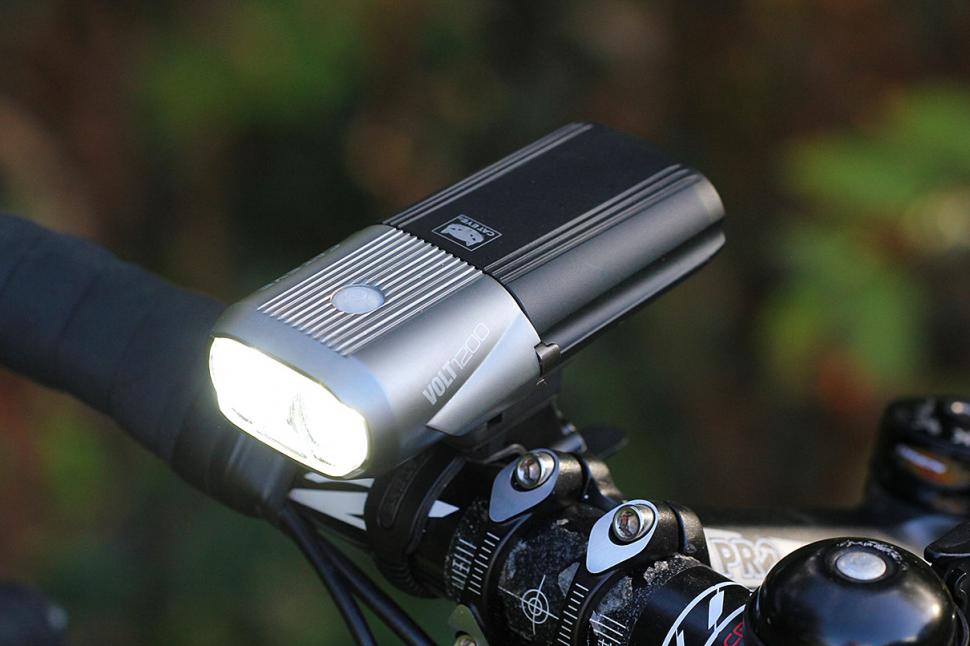 Cateye Volt 1200
Cateye Volt 1200£149.99
VERDICT:
Really good all-purpose high-power light with good power options and battery life for road riding
Weight:
234g
Contact:
www.zyro.co.uk
At road.cc every product is thoroughly tested for as long as it takes to get a proper insight into how well it works. Our reviewers are experienced cyclists that we trust to be objective. While we strive to ensure that opinions expressed are backed up by facts, reviews are by their nature an informed opinion, not a definitive verdict. We don't intentionally try to break anything (except locks) but we do try to look for weak points in any design. The overall score is not just an average of the other scores: it reflects both a product's function and value – with value determined by how a product compares with items of similar spec, quality, and price.
What the road.cc scores meanGood scores are more common than bad, because fortunately good products are more common than bad.
- Exceptional
- Excellent
- Very Good
- Good
- Quite good
- Average
- Not so good
- Poor
- Bad
- Appalling
Cateye have nailed this one. They've been steadily increasing the power of their torch-style lights over the last three years and they've come out with some crackers. We loved the 250-lumen Nano Shot and we loved the 600-lumen Nano Shot Plus. And now we love the Volt.
It's not all about the maximum output. But the Volt 1200 puts out masses of light on full, more than some lights that are rated higher in terms of lumen output. You get two hours on full (Cateye's battery life predictions are pretty accurate), five hours on Normal (about half power) and a whopping 17.5 hours on All-Night, which I reckon is about what the original Nano Shot used to kick out, 250 lumens or so.
That means you can genuinely ride all night with the Volt 1200. In fact, assuming it's summer riding and you're frugal with the high beam, you could probably do a whole weekend. From a light this size that's mighty impressive. The All-Night setting is plenty of light to navigate by in the darkness, although when you're heading downhill you'll want to switch to a higher beam. Normal is generally fine for that but if you're really screaming down a descent then you can go for the mega beam; I seldom used it on road. In the woods it's fantastic: the amount you can see is astonishing, to the point that your skill, not the visibility, is often the limiting factor.
On the road, it's often too much: certainly when you're in traffic it's just too bright to use considerately. Even on Normal I got flashed a couple of times by cars thinking I was a motorbike stuck on full beam. Most of the time I stuck to low power, using the higher beams on deserted lanes. There's a Hyperconstant setting too, which is low power with a full-beam strobe; that's brilliant for getting seen in the daytime. Double click the button and you get a standard flashing mode that's also good around town.
That double click is the only major issue with the light. More than once on a dark lane I'd try to switch from high beam to All-Night mode (two clicks) to avoid dazzling an oncoming car/cyclist/pedestrian only to find myself in flashing mode which is very much not adequate for staying out of the hedges in the dark. If you're in Normal mode it's not an issue, as it's only one click to All-Night.
The beam isn't road specific – in fact Cateye's product video of the Volt shows it mostly used off-road – but so long as you're sensitive to other road users it's not really an issue. There's decent side visibility from the lens design, although it'd be nice to have a touch more.
The LEDs also light up the mode button so it's easy to find in the dark, although my gloved hands would like it to be a bit bigger. And a red LED comes on inside that button when it's time to charge the Volt - that takes ages on a computer USB port (14 hours!) so it's better to try and find a high-output USB transformer that'll juice it up overnight.
I've had to charge the Volt less than once a week based on a half-hour each way commute; at that rate the 6200mAh battery will last about six or seven years. The light is very well built with an alloy/nylon body that's proved to be more than a match for the elements.
The mount is Cateye's FlexTight bracket which is a kind of plastic Jubilee clip. It doesn't sound that sexy but you can swap it between bikes in about half a minute and it holds the light firmly, and is adjustable for tension so you can keep the Volt adjustable by hand, useful for on-the fly adjustments.
There's a lot to like about this light. It's insanely bright on full, has good power options for the road, is well built and waterproof, has a long battery life and is easy to switch between your bikes. £150 isn't cheap but it'll do you for both on- and off-road and should last a few years. That makes it well worth considering as an investment.
Verdict
Really good all-purpose high-power light with good power options and battery life for road riding.
The light comparator
If you have a nice big screen you can click here for the widescreen version (1400x1000px)
road.cc test report
Make and model: Cateye Volt 1200
Size tested: Black, Front light
Tell us what the light is for, and who it's aimed at. What do the manufacturers say about it? How does that compare to your own feelings about it?
The Volt1200 emits 1200 lumens of light through 2 super bright LEDs. This light features 5 modes: Dynamic, Normal, All-Night, Hyper Constant and Flashing. The Volt1200 has a Lithium-ion rechargeable cartridge battery that is safe to change. With a 2 hour run time on Dynamic Mode and optional helmet mount, the Volt1200 will take you from the bike lane to the trail.
Tell us some more about the technical aspects of the light?
Features Tech Specs Manuals Small Parts
Dimension: 112.0 x 58.9 x 43.8 mm
Weight: 214 grams (light unit and battery)
Light source: High intensity white LED X2
Light output: 1200lm
Run time:
Dynamic mode: approx 2hrs
Normal mode: approx 5hrs
All-Night mode: approx 17.5hrs
Hyper Constant mode: approx 14.5hrs
Flashing mode:
approx 100hrs
Battery:
Li-ion rechargeable battery (3.6V-6200mAh)
Recharge time: approx 8-14 hrs 80% full recharge in 10hrs.
Recharge/discharge number of times: about 300 times(until the rated capacity drops to 70%)
Other: Low battery indicator, lighting mode memory function
Rate the light for quality of construction:
9/10
Really solid build.
Rate the light for design and ease of use. How simple was the light to use?
7/10
Mostly great, but double click to flashing is annoying when you're cycling through the modes.
Rate the light for the design and usability of the clamping system/s
9/10
The FlexTight bracket is simplicity itself.
Rate the light for waterproofing. How did it stand up to the elements?
9/10
Very well sealed.
Rate the light for battery life. How long did it last? How long did it take to recharge?
8/10
Battery lasts for ages in normal and all-night modes. You need to seek out a high-output USB source though.
Rate the light for performance:
9/10
Fantastic light on or off road.
Rate the light for durability:
8/10
Very well built.
Rate the light for weight, if applicable:
7/10
Not the lightest and too heavy for a helmet, but fine.
Rate the light for value:
8/10
£150 isn't cheap but the Cateye delivers comparable or better outputs than many other top end lights costing more - in some cases significantly more.
Tell us how the light performed overall when used for its designed purpose
Excellently.
Tell us what you particularly liked about the light
Beam strength, long-lasting low-power modes, build, bracket.
Tell us what you particularly disliked about the light
double click to flashing caught us out a few times, side visibility could be better.
Did you enjoy using the light? Yes.
Would you consider buying the light? Yes.
Would you recommend the light to a friend? Yes.
About the tester
Age: 40 Height: 190cm Weight: 102kg
I usually ride: whatever I'm testing... My best bike is: Genesis Equilibrium 853
I've been riding for: 10-20 years I ride: Every day I would class myself as: Experienced
I regularly do the following types of riding: commuting, club rides, sportives, general fitness riding, fixed/singlespeed, mtb, Mountain Bike Bog Snorkelling, track
Dave is a founding father of road.cc, having previously worked on Cycling Plus and What Mountain Bike magazines back in the day. He also writes about e-bikes for our sister publication ebiketips. He's won three mountain bike bog snorkelling World Championships, and races at the back of the third cats.
Latest Comments
- ErnieC 28 min 57 sec ago
or Team Bahrain ... selective outrage.
- newbankgyratory 1 hour 31 min ago
This website offers suitable data: https://www.automobiledimension.com/large-suv-4x4-cars.php
- newbankgyratory 2 hours 4 min ago
Perhaps park the goods in a US Customs Bonded warehouse and then import them out of there when the tariff nonsense settles down?...
- Dnnnnnn 2 sec ago
Good to see a road.cc review of what must be one of the UK's best-selling 'proper' road bikes....
- PRSboy 2 hours 59 min ago
Another thing ruined by the Americans
- Miller 4 hours 18 min ago
Nice to see WvA featuring in the finale.
- Miller 4 hours 20 min ago
I have known more than one elder statesman of the club die of a heart failure while out on a ride. Sometimes I feel that's about to happen to me,...
- Pub bike 4 hours 38 min ago
Via the "wireless active steering system".
- Hirsute 5 hours 2 min ago
137m is the farthest I have observed when quickly looking at the Garmin unit....
- pockstone 5 hours 19 min ago
Yours worked wonders, but if you insist, I'll hop to it...why the need for extra police? Did the fire brigade bottle it?
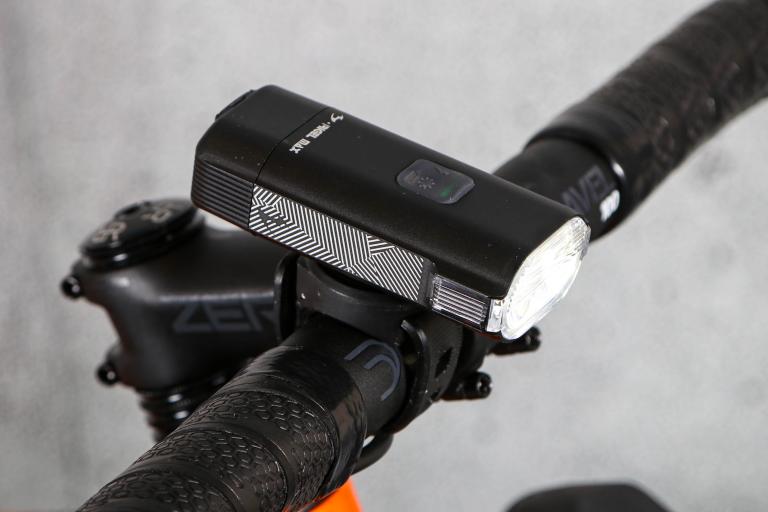
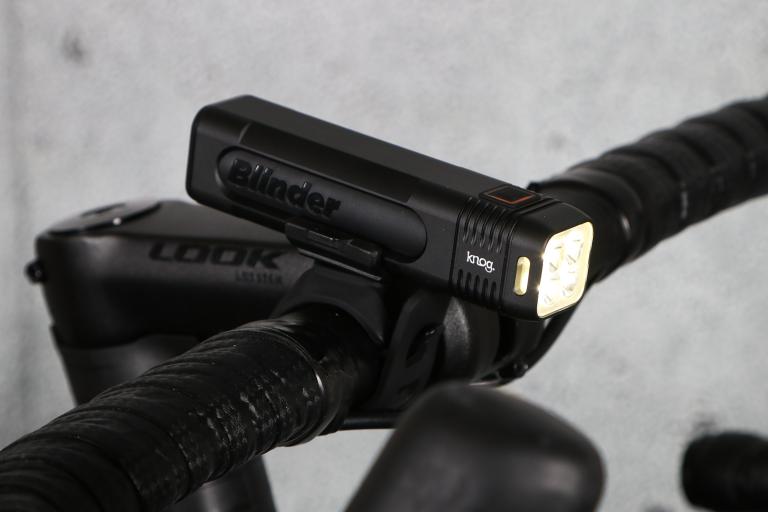
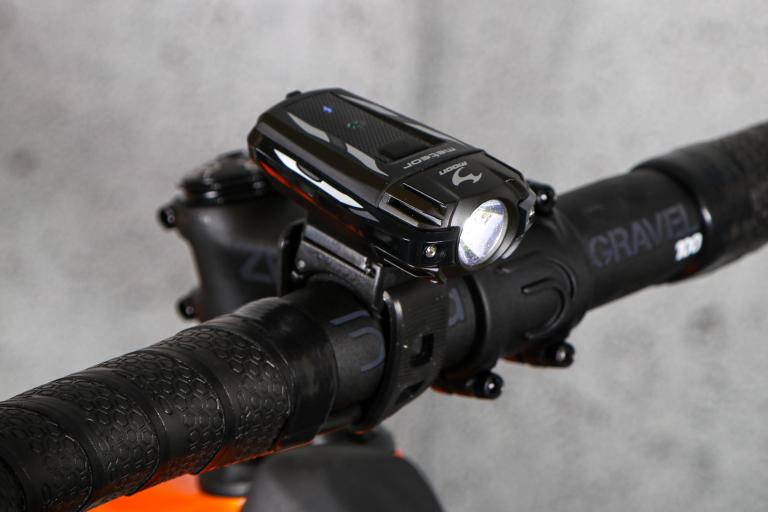
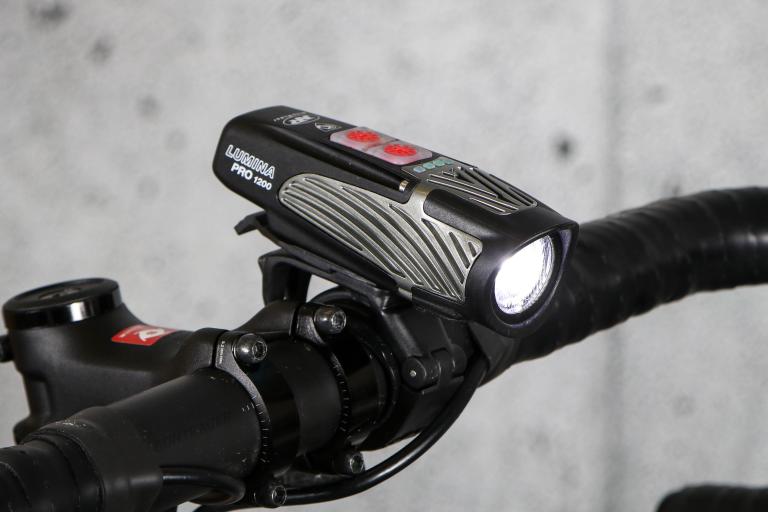
Add new comment
20 comments
https://roubaixcycling.wordpress.com/2016/01/10/cateye-volt-1200/
My review above
I used the light comparator to compare the Cateye Volt 1200 with the B&M IQ Cyo NT headlight. One of my bikes has a similar B&M IQ Cyo RT headlight powered by a Shimano DH 3N72 front dynamo hub, which is actually an alternator. My first impression was that the new Cateye light was far better in light output, until I dug a little deeper. The two lights are compared in entirely different surroundings. The Cateye light is demonstrated on a country lane lined with a hedge on at least one side, and being powered by a rechargeable battery system allows the light to display full brightness at zero speed, with everything posed including the car. Meanwhile the B&M light appears to be in some sort of concrete conveyor gallery with a set of rollers fastened to the floor preventing the bicycle from moving, and therefore generating any power. Typically B&M headlights switch to a reduced intensity for several minutes after the bike stops, such as at traffic lights. In addition the smooth concrete wall would not reflect light as well as the hedge seen on the Cateye light test. Hardly a fair comparison.
I have several bikes now fitted with the B&M IQ Cyo headlights and I see far better illumination than what I see on the light comparator. Being a Canadian cyclist I have on two occasions picked out black bears in pitch blackness at a suitable distance, using the B&M lights. The cost of a B&M light plus the front hub and a tail light to boot is not a lot more than the single Cateye light, which in any case will require a tail light as a companion. The B&M lights correctly set do not put a lot of waste light up in to the trees, which would blind approaching motorists. Then of course I do not have to remember to charge the battery. I think I will remain content with the B&M lights for the time being.
Interesting point as I too have a B&M IQ Fly on one bike, a B&M Lumotec Lyt on another, and a Philips SafeRide 60 on another. The illumination of all these is fantastic, much better illumination on the road than my MagicShine MJ808E (except for the 25 lumen B&M Fly). It definitely doesn't look like the picture in the comparator, though I don't have all the other lights to compare.
As an hgv driver, I have to say that this type of light is becoming a serious safety problem, because so many purchasers are either unaware of, or are willfully determined to ignore, the consequences of blinding drivers and other road users.
Some people have mentioned tilting these lights down a bit, but I know from experience with my own light that I need to aim it down by about 80 degrees before it stops dazzling others, which renders it pretty useless for a trip that combines both urban and "dark" roads.
If you're going to use one of these lights, make sure you leave it switched off in town, and have some way of instantly killing the power when out in the lanes.
I was going to ask why you'd want 1200 lumens (off road excepted) when 250-300 is plenty for road use but you make a good point about the (huge) battery life.
I bought the Volt 300 recently and have to say I've been very impressed. I've got it aimed so the bottom of the beam catches my front tyre and it lights the road for about 30 feet (and doesn't seem to blind oncoming riders, no complaints yet at least). Compared to my other lights the beam is a really crisp white light which gives great clarity and on medium it's perfect for city use.
Wish they'd stop putting flash modes on really bright lights though. The last thing you need is 800+ lumens on strobe blared right in your face and so many people seem to do just that.
EDIT - Completely agree that what we need is mor properly hooded/lensed lights for road use. A round beam pattern is a very poor option on a road bike but I'm yet to see good options in high street stores.
Exposure nail this with the Strada, but it comes at a price.
Regarding the lumens count, I'm sorry but 300 isn't good enough for 30 - 40 mph decants on unlit country roads. These 1000 lumen lights do have a place on road bikes, but they need a 'dip' function for residential areas. Almost all these lights have exactly that, Lezyne's have a race mode that switches between them, Exposure do it, and so does the Cateye. It's irresponsible riders who give them a bad name.
A reduced power mode does not prevent blinding other road users. It takes good reflector design to properly create a dipped beam. The ability to switch between beam patterns is not common in bicycle lights. The Exposure Strada claims to have a dipped beam, but it's not clear if this is a proper dipped beam or simply a reduced brightness setting.
Here's one example of a proper dipped beam stVZO compliant Bicycle light...
http://www.roxim.com.my/p/product-rx-5.html
Here's one I own (Philips Saferide)...
http://reviews.mtbr.com/philips-saferide-led-bike-light-2012-mtbr-lights...
I don't think Exposure's Strada is any better. Look at the beam pattern in the 2013 light test compare tool and it is just as circular as the Volt.
Whats their mount quality like these days? My past experience with cateye lights is that the plastic on the light itself had a nasty habit of snapping, preventing it from securely mounting. This happened with several models I owned.
To be honest I had largely forgotten about Cateye, until recently they had fallen so far behind the likes of Lezyne, Exposure etc.
Thanks for your reply Dave - I missed your reply before my second post.
Yep that's a fair point about the angle.
Re-phrasing my question about toggling between modes - I was wondering if it is possible to toggle between full and low power without having to cycle through all of the modes (including flashing)?
This does look a potentially excellent road and MTB light - but I'd be worried about blinding oncoming traffic and wouldn't relish the thought of having to dive for the mode switch every time there was an oncoming vehicle.
Dave do you think this light would still dazzle oncoming traffic if the rider does switch it to the low power mode? Also, sorry if I'm being dim but is it possible to toggle between high power and low power.
Thanks.
I think the angle is as important as the power, if you aim the light directly at oncoming traffic it will dazzle them in any mode, angled properly it shouldn't dazzle anyone, even in high power mode.
i'm confident that the normal mode, angled at the road, isn't any more of a problem for oncoming traffic than the dipped beam of a car. the full beam is *really* bright and i wouldn't use it in traffic. the all-night setting, which is enough light for 90% of road riding, shouldn't be an issue for anyone. you naturally angle the beam down on all-night anyway, because the beam throw isn't as long.
the mode button goes full > normal > all-night > hyperconstant so going down is always straightforward, sometimes going up (eg normal to full) less so.
the great thing about this light is that you can do just about anything with it. it's not just about the full beam setting, which is impressive; it'd be a great light for a long audax, or you could commute on dark lanes on a decent beam for a whole week before it needs recharging. it's visible from the side for town use (and it has good daylight modes), and it's well built, and it's easy to swap between bikes. calling it a 'light bomber' is hugely underestimating its capability and versatility. in my opinion.
Another offensive unsophisticated light bomber that's only realty suitable for off road. I'd hoped for more from cateye, who sell some of the few BS lights still available.
What's not to like? If, like me, you live in the middle of nowhere it is often pitch black at night on the road, so a powerful light is a really useful thing. I have a nano shot + and whilst it provides plenty of light, the battery life is a little limiting, I really wish it had a 'get you home' mode just in case. This appears to have the power and the endurance I'm looking for, I can't see why you'd not like it unless you're limited to riding in town.
I live on the edge of nowhere (not really the middle of it - only a few miles to a town ) and the number of cyclists dazzling all oncomers is getting a bit annoying now. I feel that Dutch and German lights have overtaken Cateye in the last few years and it seems like this one does little to regain the initiative. I've a box of old Cateye lights and mounts and was almost a fan, but I don't expect to be buying another one soon if this is still the way they're going. It looks like they're squarely aiming at the niche off-road market and people who don't care about being obnoxious to oncoming traffic, or the law.
) and the number of cyclists dazzling all oncomers is getting a bit annoying now. I feel that Dutch and German lights have overtaken Cateye in the last few years and it seems like this one does little to regain the initiative. I've a box of old Cateye lights and mounts and was almost a fan, but I don't expect to be buying another one soon if this is still the way they're going. It looks like they're squarely aiming at the niche off-road market and people who don't care about being obnoxious to oncoming traffic, or the law.
Stupid attitude, do you think the same of all car lights, they are of very similar brightness? simply angling the light downwards is all that needs to be done.
I've got one of these and I think it's 10 times more likely to save my life than a helmet. Cars exiting side roads actually see you coming when you have one of these on your bike.
And it only takes a few seconds to untighten it and change the angle for places without street lighting.
He's right ... this light should be banned from road use as should many similar lights.
It isn't the brightness that is the problem, but the beam pattern. A proper road light should have a beam cut-off just like the dipped beam on a car headlight.
What this means is that no direct light is emitted at/above eye level for oncoming traffic, and also no light output is wasted lighting up the sky. Aiming your light down does not eliminate the problem ... and I've yet to pass a cyclist who does aim their MTB light down when there is oncoming traffic.
I too am sick of being blinded by high power MTB lights both on and off road. If you are riding an MTB trail, then there is no oncoming traffic and you need to see overhanging branches, so this light is perfect.
On road this light is a hazard to other road users.